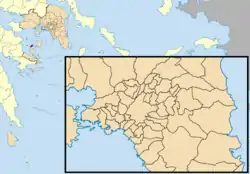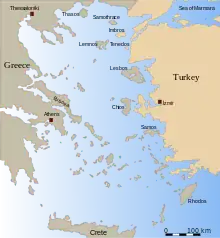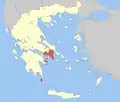Agistri
Agistri, also Angistri or Agkistri (Greek: Αγκίστρι [aɲˈɟistɾi ~ aˈɟistɾi], English: "fishing hook"), is a small island and municipality in the Saronic Gulf in the Islands regional unit, Greece.
Agistri
Αγκίστρι | |
|---|---|
 Beach of Skala | |
 Agistri Location within the region  | |
| Coordinates: 37°42′N 23°20′E | |
| Country | Greece |
| Administrative region | Attica |
| Regional unit | Islands |
| Government | |
| • Mayor | Ioannis Athanasiou (Ind.) |
| Area | |
| • Municipality | 13.37 km2 (5.16 sq mi) |
| Population (2011)[1] | |
| • Municipality | 1,142 |
| • Municipality density | 85/km2 (220/sq mi) |
| Time zone | UTC+2 (EET) |
| • Summer (DST) | UTC+3 (EEST) |
| Postal code | 180 10 |
| Area code(s) | 22970 |
| Vehicle registration | Z |
| Website | agistri-island.gr (EN) |
Settlements
There are only three settlements on Agistri - Milos (Megalochori), Skala and Limenaria. Milos (pop. 566) is the main village where the majority of the Greek population of the island lives. Skala (pop. 448) is a twenty-minute walk from Milos along the coastal road. Skala is where most of the tourist facilities and hotels are. Limenaria (pop. 128) is a very small village on the other side of the island with very little tourism. The island's population is 1,142 inhabitants according to the 2011 Greek census. Its land area is 13.367 km2 (5.161 sq mi).[2]
Geography
Agistri is a pine-covered island in the Saronic Islands group.
Agistri is very close to the larger Saronic island of Aegina. The island can be reached from Aegina by a number of boats in just ten minutes. These boats include the Agistri Express and a number of small "water taxis". The island is also an hour's boat ride from the large Athenian port of Piraeus.
Flora and fauna
Agistri is home to a wide variety of plants such as wild cyclamen, thyme, caper bushes, and thistles. The center of the island is covered in Pine forest. It hosts a population of chukar partridges. The rocky eastern coast is used as a breeding place by swifts. Noteworthy is a population of peafowls, which have been introduced to the island and since become feral.
Local economies
Agistri's primary industry is tourism. Both in Skala and Megalochori there are numerous hotels and restaurants. Local transport includes a bus and taxis. Popular beaches are Aponissos and Dragonera on the western coast, the beaches of Megalochori and Skala in the north, Mariza in the south, and Skliri and Halikiada in the east. Halikiada is popular for naturism.[3] The island also has a long history of free camping, though it is no longer allowed to erect tents in the forest due to fire hazard. Agriculture also forms part of the island's economy.
On 18 September 2015, Wall Street investor Brian Kelly announced he would be investing in the Nxt-based platform Drachmae, which has as its aim the revitalisation of the local economy of the Greek Island Agistri.[4]
Gallery
 Pine forest with hiking trail
Pine forest with hiking trail Near Mariza beach at the south eastern coast
Near Mariza beach at the south eastern coast Bay at the western coast
Bay at the western coast Panoramic image of the beach and harbor of Skala
Panoramic image of the beach and harbor of Skala Village Limenaria
Village Limenaria Fishing boat and nets at Megalochori
Fishing boat and nets at Megalochori The Church of Agioi Anargyroi, Skala
The Church of Agioi Anargyroi, Skala View from Aegina
View from Aegina Map of Agistri on a forest fire warning sign
Map of Agistri on a forest fire warning sign
 Peacock
Peacock
References
- "Απογραφή Πληθυσμού - Κατοικιών 2011. ΜΟΝΙΜΟΣ Πληθυσμός" (in Greek). Hellenic Statistical Authority.
- "Population & housing census 2001 (incl. area and average elevation)" (PDF) (in Greek). National Statistical Service of Greece. Archived from the original (PDF) on 21 September 2015.
- Achterberg, Adelaide (15 October 2019). "Why I went to a nude beach in Greece, and why you should too". thewhitonline.com. Retrieved 24 March 2020.
- Aitken, Roger. "Brian Kelly Capital Investing In First 'Fully Deployable' Digi Currency Ecosystem". Retrieved 19 September 2015.
External links
| Wikimedia Commons has media related to Angistri. |

